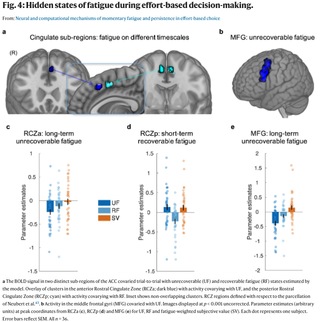Motivation
The Neuroscience of Motivation and Persistence
Why quitters quit and others retain the brainpower to keep working persistently.
Posted July 30, 2021 Reviewed by Tyler Woods
Key points
- Fatigue can make it difficult for world-class athletes and everyday people to sustain their motivation and persistence.
- New fMRI-based research shows that two types of fatigue (recoverable vs. unrecoverable) activate specific parts of the frontal cortex.
- Recoverable fatigue appears to benefit from a distinct fronto-striatal system assessing that a reward's value is worth the sustained effort.

Sometimes being a so-called "quitter" is the wisest and most admirable decision a person can make. Simone Biles and Naomi Osaka made this clear recently by showing the courage to put their mental health first and let go of a win-at-all-costs mindset of perseverance by withdrawing from athletic competitions each was expected to win.
Although there's a time and place when "giving up" is the best option, there are other times when making an effort-based choice to keep going during a workout at the gym or persevering through exhausting career-related tasks with determination and grit is worth the effort.
What's Happening in the Brain When Fatigue Strikes?
New research (Müller et al., 2021) into the neural mechanisms of perseverance suggests that two types of effort-based fatigue can reduce someone's willingness to exert effort for reward; the first short-term type of fatigue is "recoverable" after a break, whereas the second, longer-term type of fatigue is "unrecoverable."
According to the authors, "[Our] results reveal the hidden determinants of fatigue that underlie persistence in the face of effort." These open-access findings were published on July 28 in the peer-reviewed journal Nature Communications.
For this study, UK-based researchers from the University of Birmingham and University of Oxford asked, "What are the hidden internal states that change how we subjectively value effort over time and prevent us from persisting?"
In their paper's abstract, the authors note that "willingness to work can be characterized by cost-benefit trade-offs, where the value of a reward is subjectively discounted by the effort required to obtain it." Theoretically, the authors posit that "we are willing to work when we consider the value of a reward worth the effort we have to exert to obtain it."

People Can Experience Two Types of Fatigue: Recoverable Fatigue (RF) and Unrecoverable Fatigue (UF)
Interestingly, fMRI brain scans show that distinct portions of the frontal cortex are activated separately during the "hidden states" of recoverable fatigue and unrecoverable fatigue. According to the researchers, "RF is experienced as a short-term feeling, which can be overcome after a short rest." On the flip side, UF builds up over time and doesn't go away with short rests. Unrecoverable fatigue stifles motivation and stops people from wanting to persist.
Inside the fMRI, when people experienced unrecoverable fatigue during a computer-based task that required physical effort to receive a reward and decided to throw in the towel, their brain scans showed more robust signaling in the middle frontal gyri (MFG) and the anterior Rostral Cingulate Zone (RCZa).
Conversely, if their fatigue was recoverable and they made the effort-based decision to persevere after taking a short break, the posterior Rostral Cingulate Zone (RCZp) of the frontal cortex "lit up."
Additionally, Müller et al. found that when someone makes an effort-based choice about the value of a reward in relation to how much hard work it requires, a distinct fronto-striatal system is activated that integrates someone's level of fatigue with the reward's perceived value. Signaling from the ventral striatum appears to strongly influence people's motivation to keep working towards a goal.
"We found that people's willingness to exert effort fluctuated moment by moment, but gradually declined as they repeated a task over time," first author Tanja Müller said in a July 30 news release. "Such changes in the motivation to work seem to be related to fatigue—and sometimes make us decide not to persist."
"This work provides new ways of studying and understanding fatigue, its effects on the brain, and on why it can change some people's motivation more than others," senior author Matthew Apps added. "This helps begin to get to grips with something that affects many patients' lives, as well as people while at work, school, and even elite athletes."

Might Tricking Your Ventral Striatum Into Placing Higher Value on the Usefulness of Achieving a Goal Offset Unrecoverable Fatigue?
In closing, when I filter the latest research by Muller et al. through the lens of my own life experience as an elite-level athlete who had to persevere and find ways to sustain my motivation during ultra-endurance challenges, the most intriguing part of this study is how the ventral striatum seems to make "fatigue vs. value" calculations.
The latest findings (2021) on how unrecoverable fatigue can derail someone's motivation dovetail with another recent University College London study (Castegnetti, Zurita, & De Martino, 2021) which found that using your imagination to pretend that a seemingly mundane reward has usefulness and is of real value can trick the brain into persevering during goal-directed behavior.
Although this UCL study didn't specifically look at how the fronto-striatal system influences neural representations of usefulness during goal-directed behavior, one could speculate that visualizing the usefulness of a goal might also affect how the ventral striatum integrates fatigue vs. value when assessing an effort-based choice.
Anecdotally, as an athlete and in day-to-day life, I've found that cultivating an underdog mindset allows me to view small wins as a big deal in a way that can make conquering molehills feel like summiting Everest. Celebrating small wins fortifies my resilience and may also trigger the release of feel-good dopamine molecules, which makes it easier to reach the proverbial "finish line" during goal-oriented behaviors.
The latest-evidence based research suggests that flipping your self-talk script from "I don't care anymore; I need to stop for good and call it a day" to "I'm going to take a short break and regroup by focusing on why achieving this goal matters to me and keep going," might engage your ventral striatum and RCZp in ways that could prevent unrecoverable fatigue from suppressing your motivation to keep going when the going gets tough.
References
Tanja Müller, Miriam C. Klein-Flügge, Sanjay G. Manohar, Masud Husain & Matthew A. J. Apps. "Neural and Computational Mechanisms of Momentary Fatigue and Persistence in Effort-Based Choice." Nature Communications (First published: July 28, 2021) DOI: 10.1038/s41467-021-24927-7
Conrad Foo, Adrian Lozada, Johnatan Aljadeff, Yulong Li, Jing W. Wang, Paul A. Slesinger, David Kleinfeld. "Reinforcement Learning Links Spontaneous Cortical Dopamine Impulses to Reward." Current Biology (First published: July 23, 2021) DOI: 10.1016/j.cub.2021.06.069
Giuseppe Castegnetti, Mariana Zurita, and Benedetto De Martino. "How Usefulness Shapes Neural Representations During Goal-Directed Behavior." Science Advances (First published: April 07, 2021) DOI: 10.1126/sciadv.abd5363




